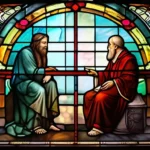Explore six key concepts that shape the philosophy of religion, from arguments for God’s existence to religious experiences.
The philosophy of religion is a fascinating field that delves into the complex relationship between human beings and the divine. In this article, we will explore six main concepts that are central to understanding this intriguing subject.
The Argument for the Existence of God
Imagine stepping into a vast, mysterious library filled with ancient tomes and volumes that explore one fundamental question: Is there a God? Philosophy of Religion delves deep into this enigma, proposing various arguments for the existence of a higher being or supreme entity. One of the most intriguing discussions is the argument for the existence of God.
Let’s start by exploring the cosmological argument. Have you ever wondered why anything exists at all? The cosmological argument suggests that everything in this universe, every event and phenomenon, must have a cause. But what caused the entire cosmos itself? This chain of causation ultimately points to something that is uncaused—a first cause or a necessary being which we call God. It’s like tracing back the branches of a tree until you find its root—the ultimate source of all existence.
Another fascinating argument is the teleological argument. Think about the intricate design and order in nature, from the microscopic world to the vast cosmos. Could such complexity arise by chance? The teleological argument posits that there must be a designer or purposeful creator behind this order—God. It’s akin to finding a watch and logically concluding it had an intelligent maker rather than arising spontaneously.
Both these arguments, among others like the ontological and moral arguments, paint a picture of God as necessary for understanding the fundamental aspects of existence. However, they don’t provide direct proof; instead, they offer persuasive rationales that resonate with many thinkers and believers alike.
But why is this discussion so crucial? It touches on the very core of what we believe about our place in the universe. The argument for God’s existence isn’t just an intellectual exercise but a journey into understanding the nature of reality, purpose, and meaning.
So, as you ponder these arguments, consider: Do they resonate with your own beliefs? Could there be other ways to interpret these complex ideas?
Religious Experience
Imagine walking through a dense forest, where every step reveals new wonders and mysteries. Now imagine that, at certain points in your journey, you experience something profound—a sense of awe, wonder, or even a feeling of being connected to something greater than yourself. These experiences are often referred to as religious experiences. But what exactly do we mean by this term?
A religious experience can be likened to peering into the heart of an ancient temple, where each stone and pillar holds stories untold. It’s a direct encounter with the divine, whether through visions, intense emotional states, or moments of profound insight. These experiences often leave individuals questioning their beliefs and understanding of the world.
So, why are religious experiences significant? Are they merely personal anecdotes or do they hold deeper truths about the human condition? Some philosophers argue that these experiences can provide compelling evidence for the existence of a higher power. For instance, if someone has a profound experience of divine presence during a natural phenomenon like a sunset or a thunderstorm, could this not suggest a supernatural force at work?
However, others might question whether such experiences are truly objective or if they are merely subjective interpretations colored by one’s existing beliefs and emotional states. It’s like seeing the same painting but interpreting it differently based on your own life experiences.
Regardless of these debates, religious experiences undeniably shape an individual’s spiritual journey. They can lead to deep introspection, changes in behavior, and a reevaluation of one’s entire worldview. Just as a single drop of water can form a river, so too can these moments create ripples that extend far beyond the experience itself.
Understanding religious experiences is crucial for anyone delving into the philosophy of religion. These encounters are not just isolated incidents but potential keys to unlocking profound questions about existence and spirituality.
The Problem of Evil
The problem of evil looms large over our understanding of a benevolent God, much like a dark cloud hangs over a bright and sunny sky. How can we reconcile the existence of suffering with the idea of an all-powerful, all-good deity? This question has puzzled philosophers and theologians for centuries, delving into the depths of human experience and divine will.
Imagine a world where every person’s life is filled with joy, love, and happiness. It’s hard to fathom how such a place could be reconciled with reality, where natural disasters, illnesses, and personal tragedies seem to defy any sense of order or justice. If God is indeed omnipotent, why can’t He prevent evil? And if God is benevolent, why would He allow it in the first place?
The problem of evil challenges us to think deeply about the nature of free will, as well as the limits of human understanding. Could it be that our perception of good and evil is fundamentally flawed, or do we need to redefine what good means when considering the suffering in the world? Perhaps there are reasons for evil that we cannot comprehend, just as some argue that evil can serve a greater purpose within a larger cosmic plan.
Some philosophers propose that the problem of evil is not so much about God’s existence but rather our understanding of it. If God exists and has chosen to allow suffering, does this mean He operates outside the bounds of human logic? Or could it be that we are simply too finite to grasp His infinite wisdom?
This question forces us to confront our own beliefs and assumptions about the nature of reality. It challenges us to explore the limits of our knowledge and faith, pushing us to consider whether there might be aspects of existence beyond what we can perceive or understand. The problem of evil is not just a philosophical puzzle; it’s a profound exploration of humanity’s relationship with the divine in the face of overwhelming pain and suffering.
Religious Belief and Knowledge
Understanding the difference between religious belief and knowledge is like distinguishing between a warm hug from a stranger and one from someone you trust deeply. In philosophy, we often find ourselves pondering why people hold certain beliefs about God or gods. How do these beliefs become knowledge? Can they be justified in any meaningful way?
Religious belief, much like a hunch, is something that comes naturally to many individuals. It can be sparked by personal experiences, cultural influences, or the teachings of religious communities. But how does this belief transform into knowledge? Knowledge requires more than just feeling or intuition; it demands evidence and reason.
In philosophy, one might ask: Can we ever truly know that a particular religious claim is true? Consider the natural theology arguments for God’s existence. These arguments often rely on logical reasoning to demonstrate that certain attributes or events can only be explained by the presence of a divine being. For instance, the teleological argument, which suggests that the complexity and order in nature imply the existence of a designer, is an attempt to justify belief through reason.
However, just as with any form of knowledge, religious claims need to withstand scrutiny. They must be open to debate and evaluation based on available evidence and rational argumentation. This process involves questioning not only what we believe but also why we believe it. It’s akin to critically examining a friendship: Are the bonds based solely on shared interests or do they stand the test of deeper, more profound experiences?
Similarly, religious knowledge requires not just belief but a structured and justified understanding. Philosophers often discuss the concept of justified true belief, which suggests that for a belief to be knowledge, it must meet three criteria: it must be true, it must be believed, and there must be justification for holding this belief.
In summary, while religious beliefs are deeply personal and can provide comfort and guidance, they become more compelling when they can also be justified through logical reasoning and evidence. The journey from belief to knowledge is not always straightforward, but it’s a necessary one if we want our religious convictions to hold any weight in the world of philosophy.
The Nature of Religion
What exactly is religion? Is it merely a set of beliefs and practices, or does it carry deeper meanings that shape our understanding of the world and our place in it? The philosophy of religion delves into these questions, exploring the diverse concepts that define religion and its significant roles in human societies. Let’s explore some key definitions and their implications.
One common view defines religion as a system of beliefs and practices centered on sacred things, including gods, spirits, or other transcendent entities. But is this all there is to it? Can we equate religion with mere superstition, or does it serve a more profound purpose in our lives?
- Functionality: Religion often acts as a social glue, fostering community cohesion and providing moral guidance. It can offer solace during times of hardship and instill a sense of belonging among its followers.
- Moral Framework: Many argue that religion provides a moral compass, guiding individuals on how to live their lives ethically and justly. Yet, does this framework vary significantly between different religious traditions?
Moreover, the philosophy of religion examines how these definitions interact with broader societal structures. How do economic factors influence religious practices? And in what ways can political systems impact the flourishing or suppression of certain religions within a given society?
Understanding the nature of religion is crucial for navigating its complex dynamics. As we move forward into discussions on religious experiences and arguments for God’s existence, it becomes clear that these concepts intertwine with each other, forming a rich tapestry that defines our spiritual landscape.
Religious Pluralism and Dialogue
Understanding religious pluralism and dialogue between different faiths can be like exploring a vast, interconnected web where every strand represents a unique belief system. Imagine walking through a forest of diverse religions—each tree standing tall with its own roots, branches, and leaves. How do these trees coexist without one overshadowing the others? That’s what religious pluralism seeks to answer.
Religious pluralism acknowledges the existence of multiple faiths within a society. It’s not about one religion being superior but recognizing that each has its own perspective on truth and morality. In this metaphor, imagine a garden where different flowers bloom in harmony—each with its distinct fragrance and beauty.
Why is dialogue between different faiths so important? Just as differences in soil, climate, and care can lead to varied outcomes among plants, so too can these differences result in diverse interpretations of religious texts. Dialogue allows for a mutual exchange of ideas, fostering understanding and respect. It’s like a conversation where everyone listens and learns from each other, enriching the collective knowledge.
Consider how arguments about the existence of God (or deities) can sometimes be seen as debates in a courtroom, with each side presenting evidence and witnesses to support their case. Dialogue here is like finding common ground where both parties can stand together, even if they disagree on certain points.
In essence, religious pluralism and dialogue are not just about tolerance but about building bridges across faiths. They encourage us to see beyond our own traditions and embrace the diversity that enriches our world. In this metaphor, imagine a grand symphony where each instrument plays its part, creating a harmonious whole.
Conclusion
 By examining these key concepts, you will gain a deeper appreciation for the philosophy of religion and its impact on our lives and beliefs.
By examining these key concepts, you will gain a deeper appreciation for the philosophy of religion and its impact on our lives and beliefs.











